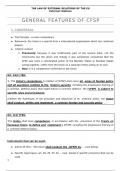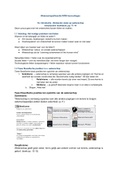THE LAW OF EXTERNAL RELATIONS OF THE EU
External relations
GENERAL FEATURES OF CFSP
1. CONFERRAL
► The Principle : a union competence
► Relevance: the Union is a special form o international organisation which has conferred
powers
► historic context
o Previously: because it was traditionally part of the second pillar, not the
Community but the Union and initially it was sometimes considered that the
CFSP was more a coordinated action of the Member States or Member States
acting together, rather than the Union as a separate entity acting on its own.
o Now: it is a competence confirmed on the Union
Art. 24(1) TEU:
‘1. The Union’s competence in matters of [CFSP] shall cover all areas of foreign policy
and all questions relating to the Union’s security, including the progressive framing of
a common defence policy that might lead to a common defence. The [CFSP] is subject to
specific rules and procedures.
2.Within the framework of the principles and objectives of its external action, the Union
shall conduct, define and implement a common foreign and security policy, ...’
Art. 2(4) TFEU:
‘The Union shall have competence, in accordance with the provisions of the Treaty on
European Union, to define and implement a [CFSP], including the progressive framing of
a common defence policy.
Instruments that can be used:
► Article 25 TEU : ‘The Union shall conduct the [CFSP] by: … (see below)
► Specific legal bases: art. 28, 29, 33, 42 … (see below) specific provisions that can be
used
1
, THE LAW OF EXTERNAL RELATIONS OF THE EU
External relations
► Art. 37 TEU: ‘The Union may conclude agreements with one or more States or
international organisations in areas covered by this Chapter’ (procedure: art. 218
TFEU);
CSDP
Article 42 TEU:
‘1. The common security and defence policy shall be an integral part of the [CFSP]. It
shall provide the Union with an operational capacity drawing on civilian and military
assets. The Union may use them on missions outside the Union for peace-keeping,
conflict prevention and strengthening international security in accordance with the principles
of the United Nations Charter. The performance of these tasks shall be undertaken
using capabilities provided by the Member States.’
Art. 43(1) TEU:
‘The tasks referred to in Article 42(1), in the course of which the Union may use civilian and
military means, shall include joint disarmament operations, humanitarian and rescue
tasks, military advice and assistance tasks, conflict prevention and peace- keeping tasks,
tasks of combat forces in crisis management, including peace-making and post-
conflict stabilisation. All these tasks may contribute to the fight against terrorism, including
by supporting third countries in combating terrorism in their territories.’
MEMBER STATE OBLIGATIONS IN THE CFSP
Article 42(7) TEU: (mutual assistance clause)
‘If a Member State is the victim of armed aggression on its territory, the other Member
States shall have towards it an obligation of aid and assistance by all the means in
their power, in accordance with Article 51 of the United Nations Charter. This shall not
prejudice the specific character of the security and defence policy of certain Member States.
Commitments and cooperation in this area shall be consistent with commitments under the
North Atlantic Treaty Organisation, which, for those States which are members of it,
remains the foundation of their collective defence and the forum for its implementation.’
invoked once by France for the Paris attack
2
, THE LAW OF EXTERNAL RELATIONS OF THE EU
External relations
Compare Art. V Washington Treaty (NATO) and Brussels Treaty (WEU, dissolved in
2011)
Art. 42(7) TEU: invoked after Paris attacks, see Foreign Affairs Council meeting of
16-17 November 2015:
‘MEETING OF DEFENCE MINISTERS Mutual defence clause (article 42(7) TEU)
Defence ministers discussed the reaction to the Paris attacks of 13 November 2015.
French President François Hollande had invoked article 42(7) of the Treaty on
European Union, requesting bilateral aid and assistance from the other EU member
states. Ministers expressed their unanimous and full support for France and their
readiness to provide all the necessary aid and assistance. In the coming days France
will have bilateral discussions with other member states.
As pointed out by High Representative, offers of material assistance or of support in
theatres of operation where France is engaged may be made. No formal decision or
conclusion by the Council will be required to implement article 42(7). The High
Representative underlined that this is not a CSDP operation, but an activation of
bilateral aid and assistance.’
Art. 222 TFEU (solidarity clause):
‘1. The Union and its Member States shall act jointly in a spirit of solidarity if a Member
State is the object of a terrorist attack or the victim of a natural or man-made disaster. The
Union shall mobilise all the instruments at its disposal, …
2. Should a Member State be the object of a terrorist attack or the victim of a … disaster, the
other Member States shall assist it at the request …. the Member States shall
coordinate between themselves in the Council.
3. The arrangements for the implementation by the Union of the solidarity clause shall
be defined by a decision adopted by the Council ….
4. The European Council shall regularly assess the threats facing the Union in order to
enable the Union and its Member States to take effective action.’
Dual obligation on each member state if this article is invoked by a MS but also on the Union
See also CD of 24 June 2014 on the arrangements for the implementation by the Union of the
solidarity clause (2014/415/EU) [2014] OJ L 192/53
NATURE OF THE CFSP
3
, THE LAW OF EXTERNAL RELATIONS OF THE EU
External relations
Art. 2(4) TFEU:
‘The Union shall have competence, in accordance with the provisions of the Treaty on
European Union, to define and implement a [CFSP], including the progressive framing of a
common defence policy.’
Art. 24(1) TEU:
‘The [CFSP] is subject to specific rules and procedures’.
► No hierarchy between the two treaties, it only indicates the nature of the CFSP
► What is specific about the CFSP:
o the directives and regulations cannot be used at CFSP;
o Parliament and Commission have smaller roles than normal ;
► Even when the Union has a policy to act, it doesn’t depreive MS of their competence to
still conduct their own national foreign policy as long as they don’t contradict the Union
policy
► Sui generis competence – similarities with shared “parallel” competences (both the
Union and MS are competent; when the Union can’t act, the MS can act on it’s behalf)
o When the union has acted, the MS lose their competence to act
o Parallel competence: even if the union acts, it doesn’t deprive MS to act as well
research (union research programms)
-> exercise by Union does not exclude MS action provided it is consistent with Union policy
13. Declaration concerning the CFSP
‘The Conference underlines that the provisions in the [TEU] covering the [CFSP],
…, do not affect the responsibilities of the Member States, as they currently
exist, for the formulation and conduct of their foreign policy nor of their national
representation in third countries and international organisations.’
14. Declaration concerning the CFSP
‘In addition to the specific rules and procedures referred to in paragraph 1 of
Article 24 [TEU] , the Conference underlines that the provisions covering the
4





